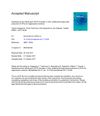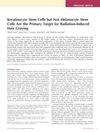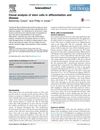 86 citations,
May 2011 in “Journal of The American Academy of Dermatology”
86 citations,
May 2011 in “Journal of The American Academy of Dermatology” How bad a woman's hair loss is doesn't always match how it affects her happiness and daily life.
 75 citations,
June 1999 in “Pediatric Clinics of North America”
75 citations,
June 1999 in “Pediatric Clinics of North America” The document concludes that early recognition and treatment of PCOS in adolescents is crucial for managing symptoms and long-term health risks.
 58 citations,
November 2020 in “International Journal of Dermatology”
58 citations,
November 2020 in “International Journal of Dermatology” COVID-19 may cause a temporary hair loss condition called telogen effluvium in some patients after recovery.
 57 citations,
March 2018 in “International Journal of Molecular Sciences”
57 citations,
March 2018 in “International Journal of Molecular Sciences” The extracellular matrix is crucial for controlling skin stem cell behavior and health.
51 citations,
March 2001 in “Clinics in dermatology” Bleaching damages hair, making it rougher and weaker.
 50 citations,
January 2016 in “The FEBS journal”
50 citations,
January 2016 in “The FEBS journal” RANK is a key target in breast cancer treatment due to its role in tumor growth and bone metastasis.
 48 citations,
July 2002 in “Journal of Cutaneous Medicine and Surgery”
48 citations,
July 2002 in “Journal of Cutaneous Medicine and Surgery” Skin problems are common and important signs of eating disorders and treating the eating disorder can improve these skin conditions.
 45 citations,
November 2017 in “Biomaterials”
45 citations,
November 2017 in “Biomaterials” Researchers found a new way to create hair-growing structures in the lab that can grow hair when put into mice.
 38 citations,
January 2006 in “Journal of Cellular Biochemistry”
38 citations,
January 2006 in “Journal of Cellular Biochemistry” Researchers isolated a new type of stem cell from mouse skin that can renew itself and turn into multiple cell types.
 36 citations,
October 2014 in “Langmuir”
36 citations,
October 2014 in “Langmuir” Bleaching hair removes its protective top layer and exposes more hydrophilic groups, changing its chemical surface and affecting how it interacts with products.
35 citations,
July 2008 in “Dermatologic therapy” Cicatricial alopecia may be caused by immune attacks on hair follicles, gland issues, or stem cell damage.
 32 citations,
October 1999 in “Journal of women's health and gender-based medicine”
32 citations,
October 1999 in “Journal of women's health and gender-based medicine” Hair loss greatly affects women's mental health and appearance satisfaction.
 31 citations,
November 2000 in “Clinical and Experimental Dermatology”
31 citations,
November 2000 in “Clinical and Experimental Dermatology” WAA-QOL measures impact of hair loss on women's well-being.
 31 citations,
November 2000 in “Journal of the European Academy of Dermatology and Venereology”
31 citations,
November 2000 in “Journal of the European Academy of Dermatology and Venereology” Skin problems can be linked to sexual abuse, requiring careful medical and psychological evaluation.
30 citations,
November 2020 in “Journal of Advanced Research” Conditioned medium from keratinocytes can improve hair growth potential in cultured dermal papilla cells.
 30 citations,
April 2013 in “Journal of Investigative Dermatology”
30 citations,
April 2013 in “Journal of Investigative Dermatology” Radiation mainly affects keratinocyte stem cells, not melanocyte stem cells, causing hair to gray.
 27 citations,
March 2013 in “Social Semiotics”
27 citations,
March 2013 in “Social Semiotics” Commercial hair loss websites promote Propecia by making men feel insecure about baldness and suggesting it's a medical issue needing treatment.
 25 citations,
December 1992 in “Seminars in cell biology”
25 citations,
December 1992 in “Seminars in cell biology” Skin stem cells are maintained by signals from nearby cells and vary in their ability to renew and mature.
 24 citations,
January 2017 in “Journal of Cutaneous and Aesthetic Surgery”
24 citations,
January 2017 in “Journal of Cutaneous and Aesthetic Surgery” Botulinum toxin was found to be a safe and effective treatment for male pattern baldness in a small test, but more research is needed.
22 citations,
December 2013 in “Stem cells and development” Horse skin stem cells combined with platelet-rich plasma improve skin healing.
21 citations,
November 2015 in “Phytomedicine” Glycyrrhizic acid may help reduce unwanted hair growth.
 21 citations,
January 1988 in “Stress Medicine”
21 citations,
January 1988 in “Stress Medicine” Stress affects skin health and emotional well-being should be considered in skin disease treatment.
19 citations,
October 2007 in “Wound Repair and Regeneration” Epidermal stem cells maintain skin health through specific niches and signaling pathways.
18 citations,
August 2013 in “Journal of Feline Medicine and Surgery” Cats can get skin issues from things other than fleas, like insect bites, food, or allergens.
 16 citations,
January 2023 in “Acta Biomaterialia”
16 citations,
January 2023 in “Acta Biomaterialia” The hydrogel quickly stops bleeding and helps heal infected wounds.
 15 citations,
January 2011 in “Annals of Dermatology”
15 citations,
January 2011 in “Annals of Dermatology” The study concluded that neonatal occipital alopecia is common, not caused by physical friction, and usually resolves on its own without treatment.
 15 citations,
September 1984 in “Veterinary Clinics of North America: Small Animal Practice”
15 citations,
September 1984 in “Veterinary Clinics of North America: Small Animal Practice” The document explains various skin conditions in cats and how to diagnose and treat them.
 13 citations,
January 2021 in “RSC chemical biology”
13 citations,
January 2021 in “RSC chemical biology” Wnt activation shows promise for regenerative medicine but requires selective targeting to minimize risks like cancer.
 11 citations,
July 2016 in “Current Opinion in Cell Biology”
11 citations,
July 2016 in “Current Opinion in Cell Biology” New techniques have enhanced our understanding of how stem cells function and the role of mutations in aging tissues, which may influence future cancer therapies.
 10 citations,
January 2019 in “in Vivo”
10 citations,
January 2019 in “in Vivo” Finasteride boosts stem cell signals for hair growth.























